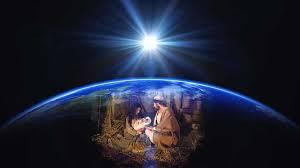
Isaiah prophesied about the gifts the Magi would bring into Jerusalem, but the world took a greater gift away from the site those men visited. The tiny seeds of grace planted in the hearts of those gift-bearing visitors grew into a global ministry. Isaiah continues:
The wealth of nations shall be brought to you; … all from Sheba shall come bearing gold and frankincense, and proclaiming the praises of the LORD.
Years after the child-turned-King sacrificed himself for his subjects, persecutor-turned-disciple Paul wrote a letter to the Ephesians about the spiritual gifts we received from the little town of Bethlehem. Although his letter was addressed to the similarly slight city of Ephesus in Asia Minor, it was really addressed to the worldwide church, including all future generations. We in this 21st century world are equal beneficiaries of that awesome gift over which Paul claimed stewardship, as we see in Sunday’s second reading (Eph 3:2-3a, 5-6):
Brothers and sisters: You have heard of the stewardship of God’s grace that was given to me for your benefit, namely, that the mystery was made known to me by revelation … that the Gentiles are coheirs, members of the same body, and copartners in the promise in Christ Jesus through the gospel.
The gift of that grace is of infinitely greater value than those brought to the infant Jesus. Knowing this, in his next letter to the Ephesians Paul must have felt the need to remind us not to turn that awesome gift of selfless love into one of selfish power (EPH 4:7, 11-14):
But grace was given to each of us according to the measure of Christ’s gift. … And he gave some as apostles, others as prophets, others as evangelists, others as pastors and teachers, to equip the holy ones for the work of ministry, for building up the body of Christ, until we all attain to the unity of faith and knowledge of the Son of God, to mature manhood, to the extent of the full stature of Christ, so that we may no longer be infants, tossed by waves and swept along by every wind of teaching arising from human trickery, from their cunning in the interests of deceitful scheming.
In Sunday’s gospel reading we meet the poster-boy of deceit, King Herod, to whom power over others was an addiction that only grew. When he heard of the entry of a newborn king on his turf, the scheming started (Mt 2:1-12):
When Jesus was born in Bethlehem of Judea, in the days of King Herod, behold, magi from the east arrived in Jerusalem, saying, “Where is the newborn king of the Jews? We saw his star at its rising and have come to do him homage.” When King Herod heard this, he was greatly troubled, and all Jerusalem with him.
Herod then tries using the magi to defend his turf, to deceive them into betraying Jesus’ location. He sent them on a mission to Bethlehem:
“Go and search diligently for the child. When you have found him, bring me word, that I too may go and do him homage.”
But the magi were recipients of a gift far greater than those they were bringing to Jesus: wisdom.
And having been warned in a dream not to return to Herod, they departed for their country by another way.
To this day, each of us continues Paul’s stewardship of God’s grace, distributed among us through our participation in many Church ministries for the benefit of the world–from Knights of Columbus to Salvation Army to Food for the Poor, to Habitat for Humanity to Brothers in Christ—all staffed by humans of many gifts. But like Herod, we also fight frailties of pride and power, and sometimes we let the grace in our heart go to our head, as happened with Christ’s disciples (Luke 9:46-48):
An argument arose among the disciples about which of them was the greatest. Jesus realized the intention of their hearts and took a child and placed it by his side and said to them, “Whoever receives this child in my name receives me, and whoever receives me receives the one who sent me. For the one who is least among all of you is the one who is the greatest.
Let’s all remember the small child whose greatness of grace continues to bring the lowly to new heights while chopping the Herods among us down to size.
–Tom Andel